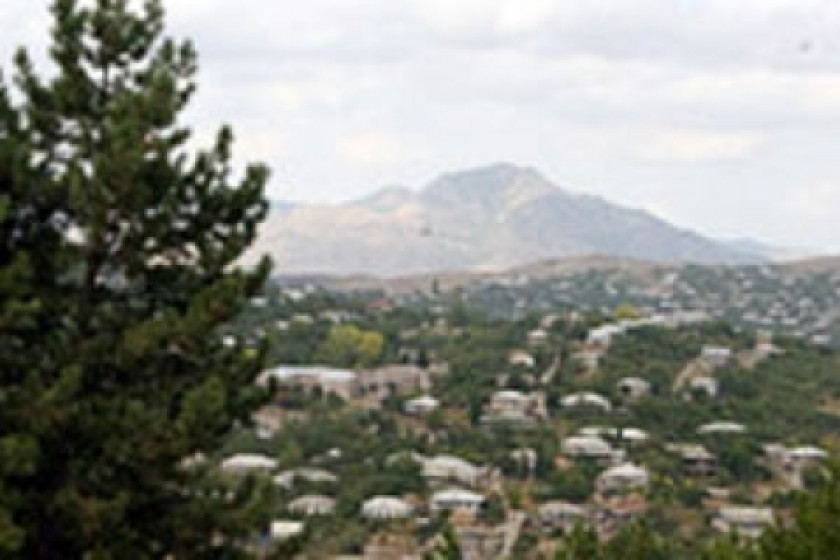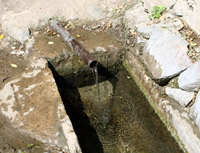
We’re Right On the Border
“Are there any areas with landmines”, is sort of a rhetorical question when it comes to the border villages in the Tavush marz. The answer is always the same; it’s just the amount of mined lands that differs according to the land’s overall surface features. The village of Sevkar (Blackstone), that lies exactly five kilometers from the border on a straight line, is no exception.
The only problem the village confronts isn’t the 360 hectares of landmines - the villagers have gotten used to that. Rather it’s the neglect of the village that they can’t come to terms with.
Mrs. Susanna says that, “ The village of Sevkar doesn’t exist, its name doesn’t even exist. I watch Haylur T.V. all day long and Sevkar isn’t even mentioned.” She worked in the tobacco industry during the Soviet era and received many rewards for her outstanding performance.
In her view Sevkar isn’t a village located near the border. “What’s this talk of being near the border; we’re right on the border. We directly felt the effects of the war on our very being, from start to finish. And now they say we’re located in the border region?”
 |
 |
 |
 |
 |
During our entire encounter with her she spoke with a great deal of passion - sometimes reliving her past life and achievements in the workplace and at other times relating the inconveniences of the present. “ Whoever lives close to that valley has water to drink, whoever doesn’t goes thirsty”, she declares as she points out the spring that an entire neighborhood of the village uses.
“ You’ll understand what Susanna is talking about when you see the line of people waiting for water in the evening”, says village mayor Vladimir Margaryan. He’s petitioned all likely and unlikely councils regarding the water problem for years on end. The village leader states that, “ nothing gets done.”
There’s a spring located some 16 kilometers from Sevkar that the villagers call ‘seven springs’. If there were a pipeline running from the spring, not only would the water needs of Sevkar be met, but those of the neighboring villages of Sarigyukh and Dsaghkavan as well.
To get a better grasp of the reality on the ground we enter a house at random. Grandpa Sevan, the owner of the house, lives alone. There’s a huge metal water tank in the courtyard. The pipe that starts from the roof of the house runs into the tank. “ When it rains, the water runs down the roof into the gutters and fills the cistern. We use the water for bathing, etc. When it doesn’t rain, we don’t use it”, says Grandpa Sevan.
His wife passed away five months ago. His four daughters are all married and live elsewhere. There’s no one around to help him. He asks, “ How the heck can I carry all that water from the spring? I need water to drink, for bathing and to do the wash.”
In Sevkar they don’t even dream of getting water for irrigation. They say there’s enough water for drinking. If and when it gets piped in they’ll use it to water nearby fields as well. Grandpa Sevan points to the grapes growing in his garden. Eight of the ten vines have wasted away. “They’re not watered, so they wither away, says the gardener. Everything needs water. If we watered them two or three times a year they wouldn’t waste away.”
In years past Sevkar received water from the Joghazi reservoir situated on the Armenian-Azeri border. Up until the start of the war Armenians and Azeris utilized the water equitably. The water was pumped to a holding reservoir located at the highest site in Sevkar from where it was distributed to the entire village. Today the armies of both sides are jointly monitoring the reservoir and it’s not possible to operate the pumping station.
Grandpa Sevan relates that, “ When we had water, none of our grapes withered away. We’d harvest the grapes and make wine and aragh (spirits). We had a life, now we have nothing.”
The hardships of life in the village have forced many to leave. “ We have about three hundred long-term absentee people, says village head Vladimir Margaryan. They live over there with their families but they send the boys to Armenia to do their military service when they turn eighteen. In a way that’s a good thing - all the ties aren’t cut.” Every spring many village residents migrate overseas to work, returning in the winter.
For example, all three of Mrs. Susanna’s sons live in Russia. They send her assistance from there. But the once active worker doesn’t like to be in this type of dependent situation. “ I’d go to work today if there was work, despite my age”, says the former tobacco worker.
Tobacco growing was once a major sector of the economy in Sevkar but due to the lack of water for irrigation it has irrevocably disappeared. “If there was water people would once again cultivate tobacco”, says the village leader. He is quick to remind us that the residents of Sevkar once led a pretty good life.
Translated by Hrant Gadarigian
 Videos
Videos Photos
Photos
Write a comment